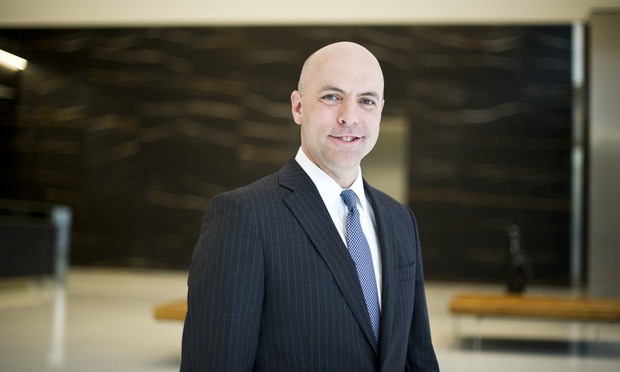Accutane Mass Tort Could Run Out of Gas After Panel Scraps Expert Testimony
The appeals court upheld a 2017 ruling barring testimony from experts who linked Accutane to certain side effects.
January 17, 2020 at 05:18 PM
4 minute read
 Paul Schmidt of Covington & Burling. October 21, 2015. Photo by Diego M. Radzinschi/ALM.
Paul Schmidt of Covington & Burling. October 21, 2015. Photo by Diego M. Radzinschi/ALM.
In a ruling that could be the last straw for the long-running litigation over acne drug Accutane, a New Jersey appeals court has barred testimony from two experts linking the drug to ulcerative colitis.
The appeals court upheld a 2017 ruling by Superior Court Judge Nelson Johnson barring expert opinions from gastroenterologist David Sachar and epidemiologist April Zambelli-Weiner. Those expert opinions incorporated the same type of "methodological defects" identified by the New Jersey Supreme Court in a landmark 2018 ruling that excluded two other plaintiffs' experts who linked Accutane to Crohn's disease, the appeals court said.
Johnson dismissed 3,231 suits based on his exclusion of the expert report on ulcerative colitis, and another 2,100 were dismissed based on the decision barring the plaintiffs' expert reports on Crohn's disease. Another Supreme Court decision in October 2018, based on a finding that Accutane's package insert followed FDA rules when it was amended to say the drug was "associated with inflammatory bowel disease," prompted the dismissal of an additional 532 cases. Only a handful of Accutane suits will remain pending if Friday's ruling is not overturned on appeal.
Appellate Division Judges Clarkson Fisher Jr., Allison Accurso and Lisa Rose said Johnson correctly evaluated Sachar and Zambelli-Weiner based on whether experts in the field would rely on their opinions. Applying an abuse-of-discretion standard, the appeals court judges said Johnson correctly excluded the experts' testimony, the appeals court said.
The ruling represents a victory for Paul Schmidt of Covington & Burling in New York, who argued for pharmaceutical company Roche at the Appellate Division. Bruce Greenberg of Lite DePalma Greenberg in Newark argued for the plaintiffs.
Roche spokeswoman Lindsey Mathias said the appeals court ruling should bring an end to the Accutane litigation after more than 17 years.
The appeals court ruling noted that Sachar relied extensively on nonepidemiological evidence, despite an almost uniform body of epidemiological evidence that found no association between Accutane and ulcerative colitis. In doing so, he failed to apply the methodology followed by other experts in the field, the appeals court said.
And Zambelli-Weiner's analysis of other studies found a statistically significant association between Accutane and ulcerative colitis, but she did not include all relevant studies, the panel said. A defense expert's analysis found no such statistically significant association, the appeals court said. The panel noted that the Supreme Court found the Crohn's disease experts, gastroenterologist Arthur Kornbluth and statistician David Madigan, likewise disregarded most epidemiological studies and relied on case reports and animal studies to support their opinions.
"In the final analysis, we find little to distinguish between the record here concerning the proffered expert testimony of Drs. Sachar and Zambelli-Weiner, and the record that led the Supreme Court to reinstate the trial judge's exclusion of the expert testimony of Drs. Kornbluth and Madigan," the appeals court said. "The trial judge did not abuse his discretion in barring the expert testimony in question. Instead, he engaged in the very same type of gatekeeping which the Supreme Court approved in its prior decision."
Accutane litigation was designated as a mass tort in 2005 and it is managed by Superior Court Judge John Porto in Atlantic County.
After the plaintiffs appealed Johnson's 2017 ruling, the case was stayed pending a separate appeal to the Supreme Court concerning opinions of Kornbluth and Madigan.
In its August 2018 decision, the Supreme Court upheld exclusion of the reports of Kornbluth and Madigan. That ruling was significant because the court raised New jersey's standard for adoption of expert testimony in products liability litigation. That ruling adopted the standard set by the U.S. Supreme Court's 1993 Daubert v. Merrell Dow Pharmaceuticals decision, which sets a high standard for the use of experts in products liability cases, more stringent than New Jersey's Rule of Evidence 702. New Jersey previously followed the more relaxed standard set in the 2002 interpretation of Evidence Rule 702 in Kemp ex rel. Wright v. State.
Greenberg and the other lead counsel for the plaintiffs, David Buchanan of Seeger Weiss in New York, did not respond to requests for comment.
This content has been archived. It is available through our partners, LexisNexis® and Bloomberg Law.
To view this content, please continue to their sites.
Not a Lexis Subscriber?
Subscribe Now
Not a Bloomberg Law Subscriber?
Subscribe Now
NOT FOR REPRINT
© 2025 ALM Global, LLC, All Rights Reserved. Request academic re-use from www.copyright.com. All other uses, submit a request to [email protected]. For more information visit Asset & Logo Licensing.
You Might Like
View All
NJ Firm Narrowly Avoids Case Dismissal Over Lengthy Complaint Filed in Fed Court
4 minute read
AstraZeneca Files Flurry of Lawsuits to Protect Cancer Treatment Drug
3 minute read
Trending Stories
- 1'A Waste of Your Time': Practice Tips From Judges in the Oakland Federal Courthouse
- 2Judge Extends Tom Girardi's Time in Prison Medical Facility to Feb. 20
- 3Supreme Court Denies Trump's Request to Pause Pending Environmental Cases
- 4‘Blitzkrieg of Lawlessness’: Environmental Lawyers Decry EPA Spending Freeze
- 5Litera Acquires Workflow Management Provider Peppermint Technology
Who Got The Work
J. Brugh Lower of Gibbons has entered an appearance for industrial equipment supplier Devco Corporation in a pending trademark infringement lawsuit. The suit, accusing the defendant of selling knock-off Graco products, was filed Dec. 18 in New Jersey District Court by Rivkin Radler on behalf of Graco Inc. and Graco Minnesota. The case, assigned to U.S. District Judge Zahid N. Quraishi, is 3:24-cv-11294, Graco Inc. et al v. Devco Corporation.
Who Got The Work
Rebecca Maller-Stein and Kent A. Yalowitz of Arnold & Porter Kaye Scholer have entered their appearances for Hanaco Venture Capital and its executives, Lior Prosor and David Frankel, in a pending securities lawsuit. The action, filed on Dec. 24 in New York Southern District Court by Zell, Aron & Co. on behalf of Goldeneye Advisors, accuses the defendants of negligently and fraudulently managing the plaintiff's $1 million investment. The case, assigned to U.S. District Judge Vernon S. Broderick, is 1:24-cv-09918, Goldeneye Advisors, LLC v. Hanaco Venture Capital, Ltd. et al.
Who Got The Work
Attorneys from A&O Shearman has stepped in as defense counsel for Toronto-Dominion Bank and other defendants in a pending securities class action. The suit, filed Dec. 11 in New York Southern District Court by Bleichmar Fonti & Auld, accuses the defendants of concealing the bank's 'pervasive' deficiencies in regards to its compliance with the Bank Secrecy Act and the quality of its anti-money laundering controls. The case, assigned to U.S. District Judge Arun Subramanian, is 1:24-cv-09445, Gonzalez v. The Toronto-Dominion Bank et al.
Who Got The Work
Crown Castle International, a Pennsylvania company providing shared communications infrastructure, has turned to Luke D. Wolf of Gordon Rees Scully Mansukhani to fend off a pending breach-of-contract lawsuit. The court action, filed Nov. 25 in Michigan Eastern District Court by Hooper Hathaway PC on behalf of The Town Residences LLC, accuses Crown Castle of failing to transfer approximately $30,000 in utility payments from T-Mobile in breach of a roof-top lease and assignment agreement. The case, assigned to U.S. District Judge Susan K. Declercq, is 2:24-cv-13131, The Town Residences LLC v. T-Mobile US, Inc. et al.
Who Got The Work
Wilfred P. Coronato and Daniel M. Schwartz of McCarter & English have stepped in as defense counsel to Electrolux Home Products Inc. in a pending product liability lawsuit. The court action, filed Nov. 26 in New York Eastern District Court by Poulos Lopiccolo PC and Nagel Rice LLP on behalf of David Stern, alleges that the defendant's refrigerators’ drawers and shelving repeatedly break and fall apart within months after purchase. The case, assigned to U.S. District Judge Joan M. Azrack, is 2:24-cv-08204, Stern v. Electrolux Home Products, Inc.
Featured Firms
Law Offices of Gary Martin Hays & Associates, P.C.
(470) 294-1674
Law Offices of Mark E. Salomone
(857) 444-6468
Smith & Hassler
(713) 739-1250







